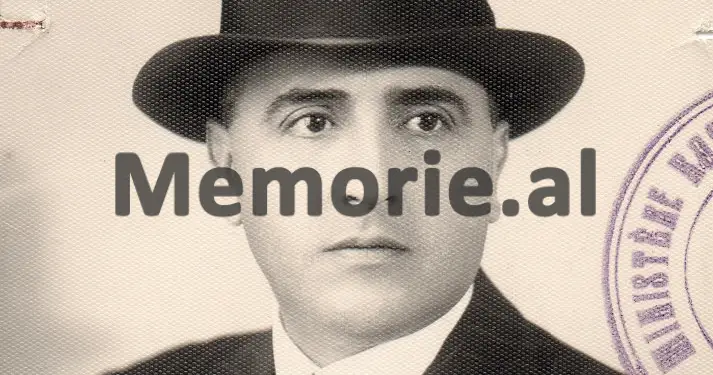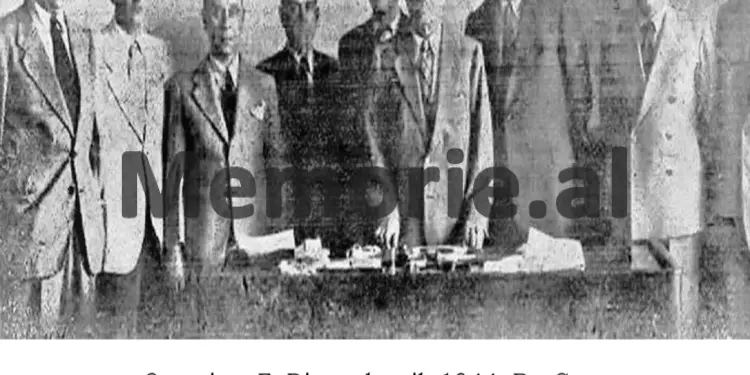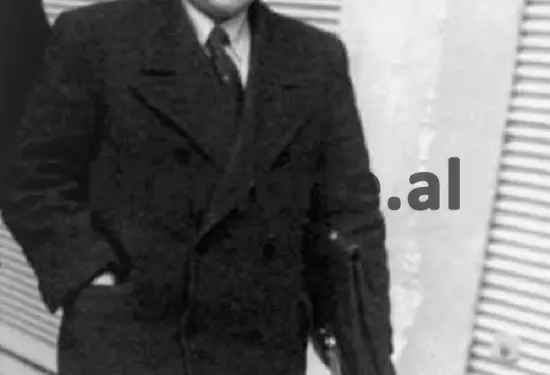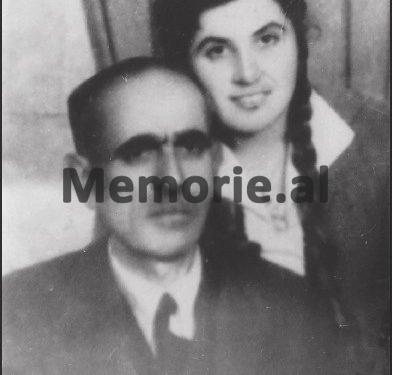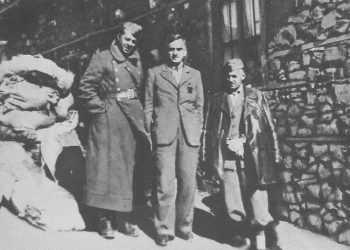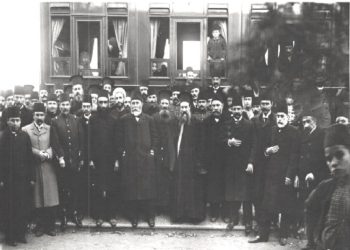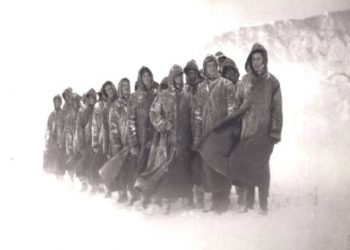By Arben Pustina
Part sixteen
-Rrok Gera, a proper statesman –
FORWARD
Memorie.al / This book aims to convey to the public the image of a perfect man, who lived in other times, but who was the best example, not only of what an ordinary man can represent, but, next first, as an example of a noble, distinguished, omniscient and, above all, honest statesman. Having in his genes the noble virtues of his origin, being formed as a personality in a wonderful environment, such as Shkodra at the beginning of the 20th century, and graduating from one of the most prestigious universities in Europe, such as that of In Vienna, Rrok Gera had all the potential to be one of the important figures who gave rise to a rapid development through comprehensive reforms in Albania in the 30s of the last century.
This development reached its peak with the government of Mehdi Frashër, considered perhaps the best Albanian government of all time, formed for the most part by non-political persons, among who was Rrok Gera. For 10 years, or more, as a minister or in other high state functions, he worked with conviction that he was walking on the right path for the consolidation of the Albanian state, a process for which he said he had no time to lose. Economist, financier, diplomat, lawyer, Gera was a specialist who advanced towards the top with his professionalism in an environment where the old factions, which were almost dominant in politics and governance, lost ground in front of young and educated people good.
Continues from last issue
MINISTER OF NATIONAL ECONOMY IN THE GOVERNMENT OF KOÇO KOTA
Historian Bernd Fisher, in his two books “King Zog and the effort for stability in Albania” and “Albania during the war 1939-1944”, gives details about the negotiations in Durrës: “… Zog once again tried to find a solution another with the Italians, sending Guzzoni two emissaries, as Mussolini had suggested. Around that afternoon, under the protection of the Italian attaché, Zogu sent the Minister of National Economy Rrok Geraj, as well as Colonel Sami Koka, to talk with the Italians in Durrës”. Likewise, Owen Pearson, in his book “Albania in the Twentieth Century, a History”, wrote about an attempt to reach an agreement between the parties:
“…A powerful mission from King Zog consisting of Rrok Gera, Minister of National Economy and Samih Koka from the General Staff of the Albanian Army, accompanied by Colonel Gabrieli, Italian military attaché in Tirana, was sent to meet with the Italian forces. They sought to confer with General Guxon in order to present to him certain proposals of King Zog for the cessation of hostilities and to enter into negotiations on the basis of a military agreement, which would in turn lead to the cooperation of Italian forces with those of the Albanian army. These proposals were broadcast to Rome, but were rejected. Rrok Gera returned to Tirana late in the afternoon and reported that it was impossible to reach any agreement…”.
The mission of the Albanian delegation on April 7 is also mentioned by Michael Schmidt Neke, in his book entitled “Enstsehung und Ausbau der Konigsdiktatur in Albanien, 1912-1939”, where he wrote that: “Zog sent the commander, the minister of the National Economy Rrok Gera, so that an agreement could be reached at the last moment”. The role of Rrok Gera in the April 7 talks with Guzzoni was also written by historians in the period of monism, such as, for example, in the magazine “Historical Studies”, in the article “Italo-Albanian relations on the eve of the fascist invasion” authored by Enver Gabë, as well as in the article “The Aggression of Fascist Italy”, authored by Viron Kokë.
In conclusion, it can be said that the act of negotiations of the Albanian delegation led by the Minister of National Economy, Rrok Gera, remains in history as the last attempt to stop the Italian invasion on April 7, 1939. It should be emphasized that this day did not simply represent the date of a foreign invasion, but it was a date that fundamentally changed the historical course of Albania, interrupting a path of development undertaken on the basis of bold reforms aimed at the country’s progress in all areas. Even after many, many years, when he remembered something from the past, the day of April 7, 1939, Rrok Gera considered it as the most difficult day of his life.
On April 8, Gera crossed into Greek territory with his family (wife and daughter). Bernd Fisher wrote that Gera stayed in Tirana, even according to him; the Minister of National Economy accompanied the Italian troops that were entering the Albanian capital and did not leave with the King towards Greece. It seems that Fisher is based on some reports of the then US ambassador in Tirana, Hugh Grant, who wrote that reliable sources had confirmed to him that Minister Gera had stayed in Tirana.
Usually, an ambassador is correct in what he writes, so he is reliable in general, but Tirana on April 7-8, 1939, was in a chaotic situation and the possibility of getting the news one after the other, was great. That Rrok Gera left together with many others to Greece is evidenced in the minutes of the meeting of the Albanian government held in Larisa, Greece, evidenced by the diaries of the King’s adjutant, Hysen Selmani, published in the “Korrieri” newspaper in 2003 as well as from the memories of Gera’s own eldest daughter, who traveled on April 8 with her parents to Greek territory.
Although he had worked for 10 years in a row at the head of the country’s finances and economy, as he himself testified in the court session of the Special Court in April 1945, on the day he left Albania, he had with him an amount of money that did not exceed the value of 200 paper napoleons, and that was all his wealth. In the first days of his stay in Greece, Rrok Gera did not break away from the government cabinet and in the minutes of the government meeting, held in Larisa, on April 12, he appears as the Minister of Finance, since the head of the finance department until then, he had preferred to stay in Tirana. One of the issues that were discussed the most at the first meeting of the Albanian government in exile was financial support for those high officials who were left homeless and without money. The matter in question is reflected in the minutes of the meeting of the Ministerial Council.
Due to family conditions, Rrok Gera found it difficult to continue his activity as finance minister in exile, so he asked to return from Greece to Albania, but the fascist occupation authorities forced him to go as an exile to Italy. This fact is confirmed by Bernd Fisher, when he writes that: Gera was exiled in Rome, just like his former prime minister, Mehdi Frashëri, or any other former minister. Also, Rroku’s older brother, Tefe Gera, former deputy of the Albanian Parliament, was arrested by the fascists in Shkodër in June 1939 and exiled to a deep area of Italy, Trasaco, where he stayed almost completely in isolation for about two years and a half. “If I die here, don’t leave my remains in this stinking place”, Tefa wrote to her family, during the time she was in exile.
The other brother, Lac Gera, was also fired after April 7, although his wife was of Italian nationality. After several repeated requests and declarations that he would not engage in political activity, the Italian authorities finally gave Rrok Gera permission to return to his parents’ house in Shkodër, together with his wife Gjyljeta and two daughters. In the following years, he engaged in private commercial activity and never agreed to be included in the state structures, during the entire period that the Italian fascists were occupying our country. Unlike him, a number of personalities from the time of the Monarchy, after April 7, turned the tables and became part of the power offered to them by the conqueror, who at the time was thought to be a long-term conqueror.
It is interesting to see how Dr. Hubert Neuwirth, director of the report for Albania at the Austrian Development Agency, in his book “Attitude and cooperation in Albania (1939-1944)”, categorizes Albanian political personalities into several groups. In point three of this division, he lists Rrok Gera alongside figures such as Faik Konica, Mehdi e Mithat Frashëri, Abas Kupi, etc., who, according to Neuwirth, with their views and activity represented the most honest and stable personalities in relation to the country and the national issue.
EFFORTS FOR THE NATIONALIZATION OF BKSH. MINISTER OF FINANCE IN THE GOVERNMENT OF FIQIRI DINES
In September 1943, Fascist Italy capitulated and German military troops entered the areas previously occupied by it, in Albania and Greece. In a scientific conference held in Tirana, in May 2009, on the topic “Intentions of Nazi Germany in Albania, 1943-1944”, researcher Bernd Fisher, who is considered one of the best and impartial connoisseurs of our pre-liberation history, in a new assessment related to this issue, he emphasized that he had examined a large number of German documents and had come to the conclusion that the German troops in Albania really came with a different behavior than what they had shown in other countries.
Fisher also notes that Albanian nationalists, for the sake of national interests, sacrificed much of their political reputation at the time when the Germans were settled in Albania: “…Each group approached the Germans in the name of nationalism. The role of local authorities was very important. The Germans were careful to choose local figures to work with. And these were people who had in their hearts the desire for the good of Albania. All the effort of the local authorities was to save what could be saved.
The nationalists represented “The Old tradition” and they wanted to stop the massacres that had happened in other countries. And as far as their political side is concerned, it was all against them…”, Fisher emphasized in Tirana. In support of the assessments made by him, we affirm that it is indisputable facts that the Germans in Albania, absolutely, could not do what they did to the Jews in other countries occupied by them, since the Albanian authorities of the period of years 1943-1944, they refused to hand over the lists of Jews who were in Albania at that time.
Another significant fact is that the Germans could not introduce their occupation mark (Albania was the only country where the Wehrmacht troops did not use “reichskreditkassenseheine”) and, to cover a large part of their expenses, they were forced to sell in the domestic market, large quantities of gold coins. The main thing is that the Germans could not create a truly puppet government, as they had done in other countries. As we will see below, in the summer of 1944, for example, they were not asked at all about the formation of the government headed by Fiqiri Dines. Even, in July 1944, the representation between Albania and Germany was raised to the rank of ambassadors, a sign of a special status of Albania in relation to the Germans.
We should also not forget the fact that at that time Kosovo was in an administration with Albania. It is interesting to see how the special envoy of Germany for Southeast Europe, Hermann Neubacher, commented on the issue of Albanian-German relations, in his book with the original title “Sonderauftrag Südost, 1940-45” (Special Mission Southeast, 1940- 45). In his memories of this period, Neubacher gave the essence of his view on the situation at that time in our country, including the issue of neutrality status with Albania:
“…Mehdi Bey Frashëri, if I may give my opinion, was the founder of a new category in international law. He proposed that Germany should recognize Albania’s neutrality. It had to be a “relative neutrality”!…If Germany’s enemies were to attack with troops that had the nature of military units, as part of the Albanian authorities’ decision-making in favor of the Jews, Rrok Gera gave his contribution in this direction, while he also personally helped two of his friends, husband and wife Hans and Ida Pollak, to leave Albania during the war and even gave them a considerable amount of money. It was then, therefore, that I defined Albanian sovereignty as “relative sovereignty”!
… Germany recognized the sovereignty of the Albanian Government with a single limitation; that we would have to oppose a government that gave support to our enemies. For this reason, Albania’s sovereignty was “relative” in the name of the safety of our troops. We agreed on this wording and the General Staff took official note of Albania’s “relative neutrality”. Neubacher had published these passages in 1956, that is, at the time when he was a free citizen and had served his sentence as a high official of the Third Reich, so his assessments are more reliable, compared to the time he was in office.
The German historian Christoph Stamm, in his article titled “Zur deutschen Besetzung Albaniens 1943-1944”, points out that the Albanian government, precisely based on its claim of neutrality and independence, even asked for a place in the Allied Control Commission for Italy, but failed to receive a response. At the beginning of December 1943, Radio Tirana called on the Allies to stop bombing the streets of Albania, so as not to cause civilian casualties. For this issue, the Albanian government started a protest in the Vatican; meanwhile it continued its efforts to make it known to the world, also through Switzerland, that Albania was not at war with anyone.
In response to a statement by the US Department of State, made on the occasion of the 5th anniversary of April 7, 1939, the Albanian Telegraphic Agency rejected any comparison of the presence of German troops with the Italian occupation and pledged once again for Albanian neutrality and sovereignty. However, in early June 1944, after the formation of an Albanian SS division, the Allies deemed it necessary to continue the exchange of statements with the Albanian government, indirectly linking them to Albania’s declaration of neutrality. It is understood, according to Stamm, that even these actions of the Albanian government did not have the approval of the German authorities at all. Returning to the object of this monograph, we assert that Rrok Gera, often described as “deutsche culture”, due to its formation in a German-speaking environment, such as Vienna, was not “sul” to welcome the Germans, when they came to Albania in the fall of 1943.
At that time, he dealt with trade and family matters (one of the brothers had health problems and he took him to Austria for a period of several months for treatment). But Rrok Gera could not remain indifferent when it came to important economic and financial issues in the interest of the country. In this context, a major initiative undertaken by him during 1944 was the implementation of the project for the nationalization of the National Bank of Albania. In order to have an idea of what importance the nationalization of the National Bank of Bulgaria would have for the country, we quote here Dhimitër Paskon, technical consultant at this Bank, who in his article related to this topic, emphasized: “…it is it is unnecessary to underline the central place occupied by the issuing bank in a country. Having the currency and credit policy in its hands, its action is decisive for the country’s economy. It goes without saying that such a body has great importance and political opportunities”.
After the capitulation of Fascist Italy, in September 1943, the positions of Italian capital in BKSh began to fluctuate more and more, especially with the crystallization of projects for the nationalization of this Bank by the Albanian government. In that period, the Italian financial circles had drawn up strategic plans aimed at preserving their interests, inside and outside Italy, including in Albania, which they thought they would keep as an area of their influence even after the war. From this point of view, the Italian leaders of the National Bank of Greece were instructed to make every effort to preserve the interests of the Italian financial group intact.
Faced with the pressure of projects for the nationalization of the BKSh, director Ettore Meliss wrote to Rome: “…Our point of view can be defined in this way: the wounded man and the dead man. We still have the wounded man (the National Bank of Albania) in our hands, which can be taken by the leg and dismembered. But as long as he is only wounded, even seriously, we can hope to get him to the hospital, cure him and, for better or worse, get him on his feet… The (Italian) government cannot forget the infinite interests and lives of many Italians located here. Italy cannot forget (unfortunately it seems that it has so far forgotten), an A.I.P.A., so many enterprises, functionaries and workers and give up the last remnants of our dignity”.
It’s enough to read these lines to understand what concerns the Italian leaders of the BKSh had at those moments, while below it will also be clearly seen their determination to use any means to preserve their own interest. Memorie.al
The next issue follows




